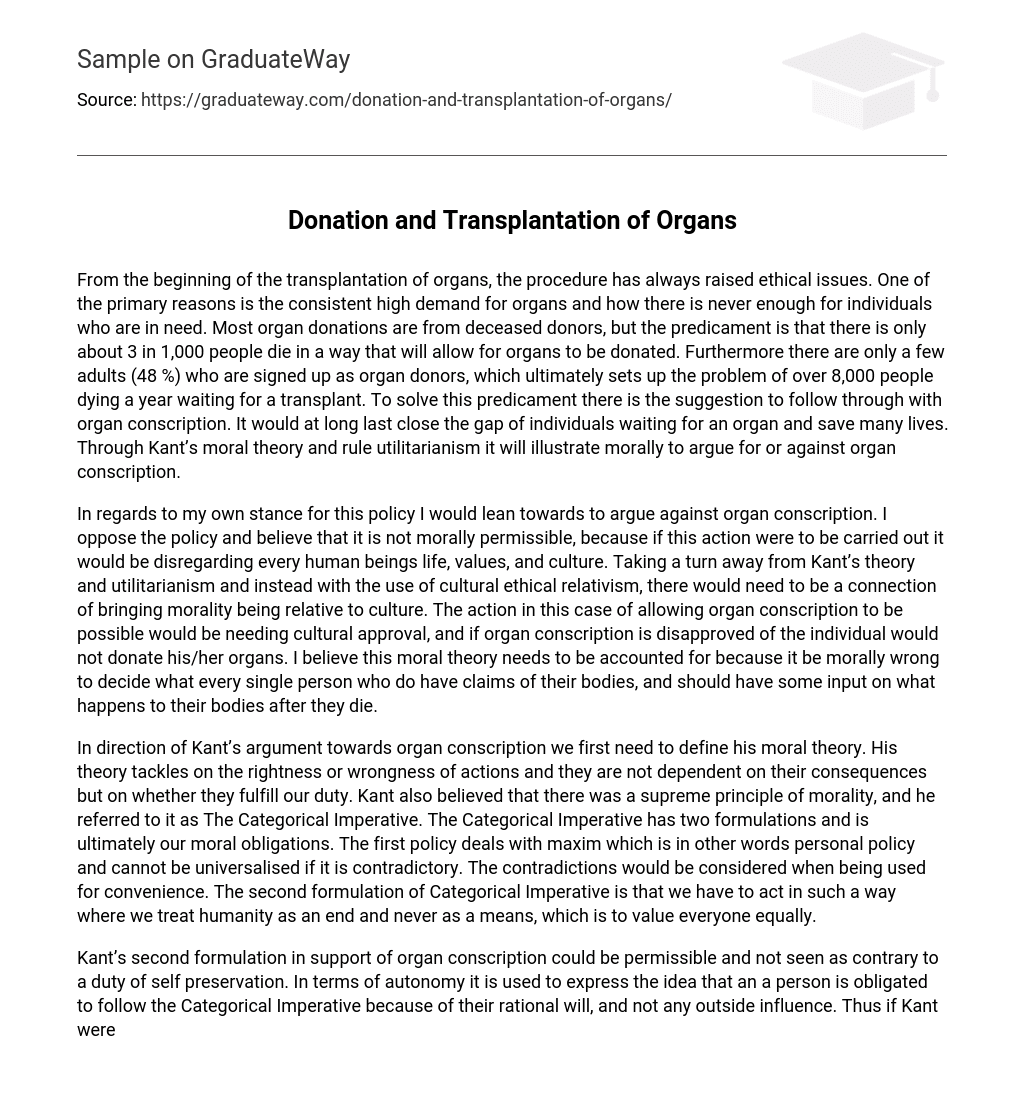From the beginning of the transplantation of organs, the procedure has always raised ethical issues. One of the primary reasons is the consistent high demand for organs and how there is never enough for individuals who are in need. Most organ donations are from deceased donors, but the predicament is that there is only about 3 in 1,000 people die in a way that will allow for organs to be donated. Furthermore there are only a few adults (48 %) who are signed up as organ donors, which ultimately sets up the problem of over 8,000 people dying a year waiting for a transplant. To solve this predicament there is the suggestion to follow through with organ conscription. It would at long last close the gap of individuals waiting for an organ and save many lives. Through Kant’s moral theory and rule utilitarianism it will illustrate morally to argue for or against organ conscription.
In regards to my own stance for this policy I would lean towards to argue against organ conscription. I oppose the policy and believe that it is not morally permissible, because if this action were to be carried out it would be disregarding every human beings life, values, and culture. Taking a turn away from Kant’s theory and utilitarianism and instead with the use of cultural ethical relativism, there would need to be a connection of bringing morality being relative to culture. The action in this case of allowing organ conscription to be possible would be needing cultural approval, and if organ conscription is disapproved of the individual would not donate his/her organs. I believe this moral theory needs to be accounted for because it be morally wrong to decide what every single person who do have claims of their bodies, and should have some input on what happens to their bodies after they die.
In direction of Kant’s argument towards organ conscription we first need to define his moral theory. His theory tackles on the rightness or wrongness of actions and they are not dependent on their consequences but on whether they fulfill our duty. Kant also believed that there was a supreme principle of morality, and he referred to it as The Categorical Imperative. The Categorical Imperative has two formulations and is ultimately our moral obligations. The first policy deals with maxim which is in other words personal policy and cannot be universalised if it is contradictory. The contradictions would be considered when being used for convenience. The second formulation of Categorical Imperative is that we have to act in such a way where we treat humanity as an end and never as a means, which is to value everyone equally.
Kant’s second formulation in support of organ conscription could be permissible and not seen as contrary to a duty of self preservation. In terms of autonomy it is used to express the idea that an a person is obligated to follow the Categorical Imperative because of their rational will, and not any outside influence. Thus if Kant were to argue for organ conscription it would be that it does not prohibit all kinds of organ donations. Some forms of organ donation do not qualify to the Kantian conception of mutilation. It could be argued, that in cases of donation individuals are pushed by motive of duty for example being in a position to help. The act of donating an organ can be considered, not only as permissible, but morally commendable. Organ donation could hardly be considered as mutilation or contrary to duty of self-preservation. Since the second formulation is brought into argument we would be treating the recipient and patient to be sure the organ is to be donated and the surgical procedure involved, and would not show any risks. Furthermore the moral personality of the donor would not be at risk by donating his organ. Thus organ conscription would be beneficial for saving lives and treating each individual with the same equal consideration.





